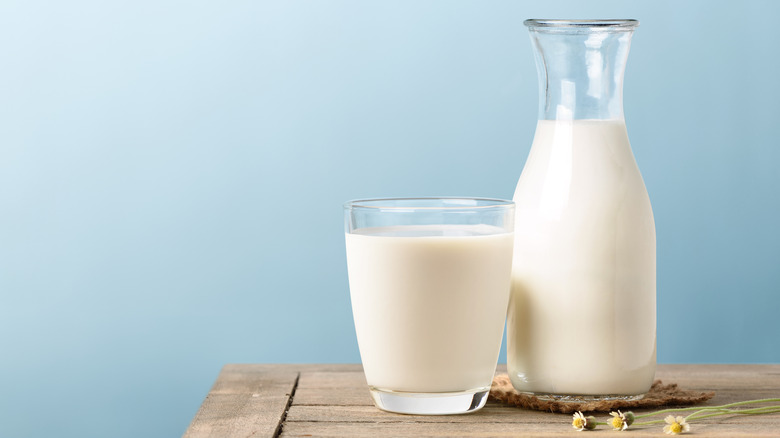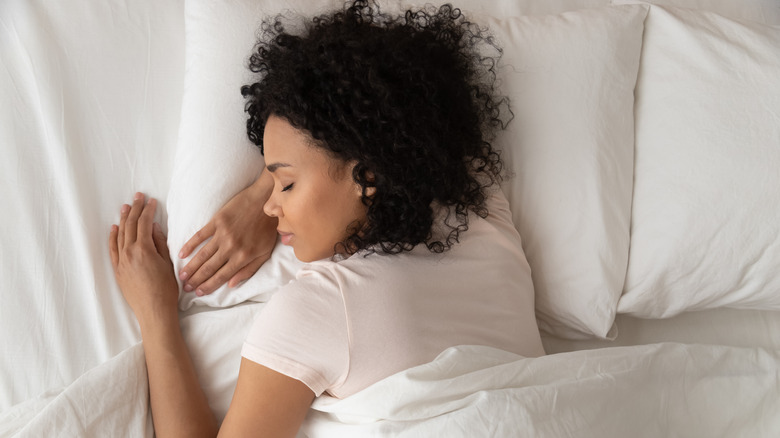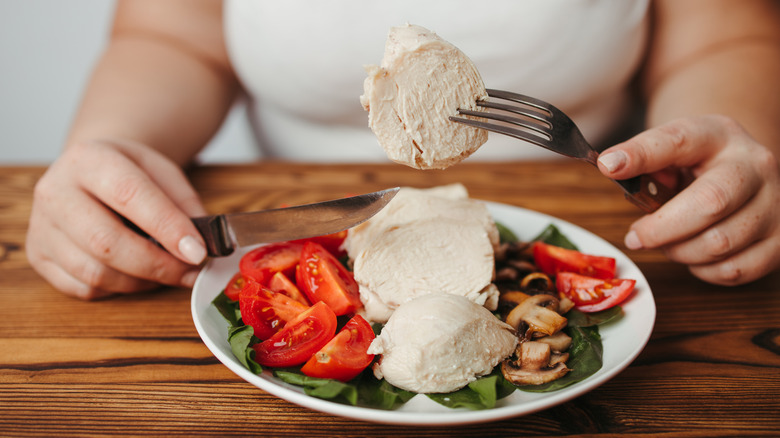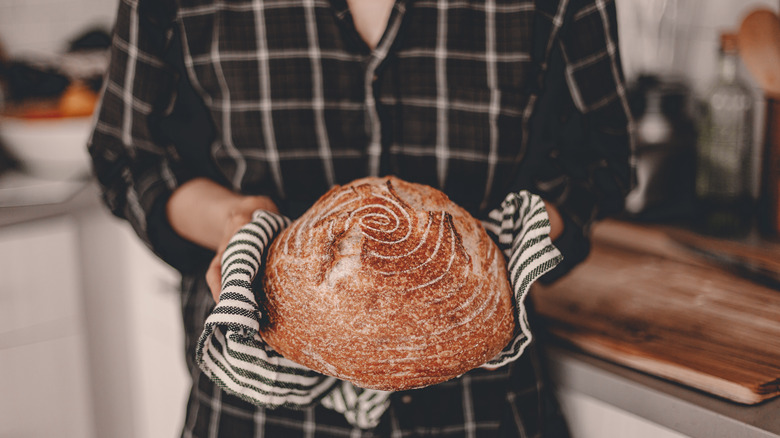Health Myths You Need To Stop Believing
When is the last time you found yourself searching the depths of the internet in hopes of figuring out that random pain in your left arm that suddenly popped up, or that weird birthmark on your chest that seems to be getting bigger? Whether we like to admit it or not, we have all probably used the internet for our health questions from time to time. And having the accessibility of the internet at our fingertips is a wonderful thing ... usually.
When we are flooded with a sea of conflicting information or even misinformation, it can become extremely overwhelming and confusing to find the facts we are looking for. And what can be even more confusing are the "he said, she said" health comments floating around. So how do we know what's correct, and what's flat-out incorrect? Dismantling the myths is the first step. Here's a look at some of the most common health myths — many of which you may currently believe.
Myth: You'll get sick if you go outside with wet hair
This was the adage our mothers used, making sure we always stepped outside in the winter with bone dry hair and a hat. But, thankfully, it's just a myth. A study published in Family Practice noted, "There is a common folklore that associates the development of symptoms of common cold with exposure to a cold environment, and that the onset of a cold is a direct result of wet clothes, feet and hair." However, both the cold and flu are caused by viruses, not by wet hair or body parts (via ABC News).
It's important to note, though, that the flu has been proven to thrive and spread more rapidly in dryer, colder temperatures. Because winter seasons are often chilly and less humid, the flu has more of a fighting chance. In a study published in the National Academy of Sciences, it was found that the cold, dry winter air can weaken immune system responses (via Yale). When it comes to avoiding a cold in the winter, it has almost nothing to do with having wet or dry hair. You can ditch the blowdryer, but be sure to boost your immune system.
Myth: You have to eat dairy to get enough calcium in your diet
Most of us have been taught our whole lives that we need milk to have strong bones, but this is a myth. Calcium is an extremely important mineral that we need in our diets, that's true, but it can be found in many sources other than dairy products. According to the Harvard School of Public Health, calcium is not only important for our bone health, but it can also help with our muscular health and aid in maintaining cardiovascular well-being.
We can get calcium from dairy as well as almonds, yogurt, squash, and leafy greens like kale and spinach. And according to Harvard, it's really the bioavailability of calcium-rich foods that we need to pay attention to. This basically means that even though we may ingest foods with calcium, our bodies don't absorb all of the nutrients.
When we know the bioavailability of a food, we know how much calcium we are going to receive. For example, a cup of cow's milk has 300 milligrams of calcium per serving, and our bodies absorb 30 percent of the calcium. While Bok choy contains fewer milligrams of calcium (160 mg) per cup, it has a 20 percent higher bioavailability than milk. "Therefore, eating 1 cup of cooked bok choy has almost as much bioavailable calcium as 1 cup of milk," Harvard explained.
Myth: It doesn't matter when you go to bed, as long as you get enough sleep
Experts say that it's important for adults to get at least seven hours of sleep per night (via National Sleep Foundation). A common sleep-related belief is that if you're getting a full night's rest, it really doesn't matter when you choose to sleep. This is unfortunately a myth, due largely to the fact that our bodies work on a circadian rhythm.
According to the National Institute of General Medicinal Sciences, circadian rhythms are the different patterns our bodies follow within a 24-hour cycle, which include both physical and mental changes. The most talked-about circadian rhythm is the one in which we are awake during the light of day, and asleep when darkness falls at night.
Some common ways our cycles can be knocked off are through traveling, insomnia, and shift work. According to a 2018 study published in Current Diabetes Reports, people who don't sleep regular hours in the evening run the risk of severely knocking off their circadian rhythm. This has been linked with some negative effects on our health, including heart disease and type 2 diabetes.
Myth: Small meals throughout the day helps with metabolism
It is often said that if we snack throughout the day and avoid large meals, we can speed up our metabolism and lose weight. However, this is a common misconception among people who are trying to shed some pounds. Eating small, more frequent meals throughout the day could have some potential health benefits, like a decrease in hunger and more opportunities to fill your body with healthy food, according to Harvard Health. But ultimately eating food more frequently does nothing for speeding up our metabolism.
A research study in the British Journal of Nutrition found that participants did lose weight when they ate more frequent meals over an eight-week period, but there wasn't a significant difference between them and another control group. They concluded that other factors, such as lowering hunger levels, were the main reason for weight loss in the participants, not metabolism. Harvard Health suggests that focusing on food quality, rather than frequency, is what can help a person lose weight.
Myth: You have to drink eight glasses of water every day
Have you ever found yourself counting cups throughout the day, or keeping track of your water intake on a notepad by your bed? This is probably because it's been ingrained in us our whole lives that we need at least eight glasses of water per day.
According to the University of Michigan Health System, this myth dates all the way back to 1945. This is when the U.S. Nutrition Board suggested that we each get 2.5 liters of water per day. What people often fail to discuss is that when this suggestion was made, it was noted that we can get some of this water content from fruits and vegetables.
Instead of sticking to a hard-and-fast rule of eight glasses a day, the University of Michigan recommends listening to you body when it comes to deciding how much to drink. In other words, drink water when you're thirsty! Our bodies are all different and have different needs, so it's important to stop and listen to what yours is telling you.
Myth: A low-fat diet is the key to good health
Most of us have been taught to fear fat. That's why we see "low-fat" items everywhere we go. Aside from the fact that most foods advertised as "low fat" have more sugar than their "regular-fat" counterparts, we actually need fat in our diets to maintain good health.
One major way that healthy fat content helps our diets is through our brain health. According to a study found in the National Library of Public Medicine, fatty acids are crucial for keeping our brains healthy and functioning at their best capacity. Research found in the Nutrition Journal states that when we are considering fat and other nutrients, we should be focusing more on the types and food sources more so than the total amount. This specific research advocates for more access to clear guidelines on where people can find healthy fats when choosing food to eat. If we know which foods supply us with healthy fats that are necessary for our health, then we may be less fearful of fat in general.
Myth: Everyone should go gluten free
Obviously if you have celiac disease, then avoiding gluten is a good idea. But the idea that gluten is intrinsically bad and should always be avoided is solely a myth. Oftentimes people choose to go gluten free because they want to slim down or have more energy. But Harvard Health Blog warns that if you don't have a gluten intolerance and just want to skip gluten for weight loss, you could miss out on some key nutrients.
One major nutrient you may be missing out on if you get rid of gluten is vitamin B. According to the Harvard publication, "Fortified breads and cereals have become a major source of B vitamins in the United States." Gluten-free bread, however, may not contain this important vitamin. Another vital nutrient that we often get from gluten products is dietary fiber, which helps aid in healthy digestion and maintaining good gut health. Harvard Health Blog mentions that we can find dietary fiber in gluten-free foods like quinoa or leafy greens, but it will help to plan this out so you know you're getting enough fiber in your day.
Myth: Eating carbs at night makes you gain weight
Have you ever stopped yourself from a carb-filled dinner or gone to bed feeling guilty about that side of rice because you were worried you'd gain weight? This could be because you've spent your whole life hearing that carbs for dinner will automatically make you gain weight. But this simply isn't true. There are a lot more factors to consider.
A research study published in the journal Obesity investigated a group of over 100 police officers with a BMI of over 30. They were put on a diet for six months that consisted of eating carbohydrates for dinner every day, getting their carbs from either two to four slices of bread or 1 to 2 cups of pasta or rice. The participants showed significant weight loss and reduction in waist size, as well as a reduction in hunger levels.
This study is proof that a lot more goes into weight loss or weight gain than just the timing of your carbohydrates. According to WebMD, we should consider the amount that we are eating, whether we are mindlessly snacking in front of the TV, and whether or not we are consuming refined carbohydrates at night.
Myth: Lifting heavy weights will cause women to bulk up
This is often a fear that women have when it comes to exercising. You may want to slim down and tone up, but you may not be looking to be the next weightlifting champion. It's difficult to know what kind of workouts are best to try in order to meet your goals, but it's important to know that weight training does not necessarily bulk you up women.
According to personal trainer Rowdy Yates in an interview with WebMD, gaining muscle is actually one of the toughest fitness goals for women because of lower testosterone levels. Men have more of this hormone, which is why you may see them bulking up quickly after some weight training sessions. But the levels of testosterone in women make it very difficult for us to "bulk up" even with a consistent weightlifting routine. If your fitness goals include staying healthy, preventing injury, and losing weight, weight training is one of the best ways, according to WebMD.
Myth: Eggs are awful for your heart health
This is one health myth that has been hotly debated for years. Growing up, your parents may have warned you about the "dangers" of eating eggs, saying it lead to high cholesterol. In a way, they weren't entirely wrong. But in general, eggs are not bad for our health. Rather, it's just important that we keep on eye on how many of them we are eating.
A research study published in the British Medical Journal in 2020 found that moderate egg consumption, defined as one egg per day, had no effect on cardiovascular health at all. So how many is too many? "While recent studies still don't offer a consistent answer, the average healthy person likely suffers no harm from eating up to seven eggs per week," Harvard Men's Health Watch explained.
However, if you eat several eggs per day, you may want to consider cutting back. Norrina B. Allen, lead author of a 2019 study on eggs, told The New York Times, that her study found many benefits of consuming eggs. However, she said, "You do want to reduce the number of eggs, especially egg yolks, as part of a healthy diet. But we don't want people to walk away thinking they shouldn't eat any eggs. That's not the right message."
Myth: Reading in dim lighting will ruin your eyesight
If you're an avid reader, you've likely avoided reading under dim lighting lest you ruin your eyesight. We've probably all been in a situation where we still attempted to read something in the dark, only to have to stop after our eyes became sore. Reading without proper lighting can cause temporary eye strain, that much is true. However, it won't permanently damage our vision like we've been made to believe.
As ophthalmologist Richard Gans was quoted as saying in a presentation by the Cleveland Clinic Office of Civic Education Initiatives, "Dim light might make it difficult for the eyes to focus, which can cause short-term eye fatigue, but there is no scientific evidence that reading in the dark does any long-term harm to your eyes."
The Cleveland Clinic also pointed to a study conducted by Dr. Katrina Schmid, associate professor at Queensland University of Technology's School of Optometry and Vision Science, which shows how our eyes focus in both bright and dim lighting. In dim lighting, our eyes have a difficult time focusing on details. This can cause eye strain and headaches. But these difficulties are typically temporary, causing no adverse consequences in the long term.
Myth: Talk therapy doesn't really work
With the rise of cognitive behavioral therapy (CBT), a type of talk therapy, many cynics have popped up with doubt about its effectiveness. Some people may say it's a waste of money, or that it doesn't really work. But this is a big misconception.
Therapy has been proven to show positive effects in many different types of participants, although more research needs to be done on whether or not therapy affects certain groups or income levels more than others. In a research study published in Cognitive Therapy and Research, CBT was proven effective for things like anxiety, depression, stress management, certain eating disorders, insomnia, substance abuse, and anger. For conditions like bipolar disorder, CBT still showed a small to medium efficacy, but is best paired with medication.
As the Mayo Clinic explained, "Cognitive behavioral therapy may not cure your condition or make an unpleasant situation go away. But it can give you the power to cope with your situation in a healthy way and to feel better about yourself and your life."
Myth: Short, high-intensity workouts are the only kind you need
This myth is a highly debated topic in the world of health and fitness. With trends like HIIT workouts taking gyms and homes by storm, it may seem that short, high-intensity workouts are always the best choice for your body. And while these types of workouts are great, this may not be what we should be focusing all of our attention on.
According to the Physical Activity Guidelines for Americans, summarized in a JAMA article, adults should be getting 150 to 300 minutes of moderate-intensity workouts per week, or 75 to 150 minutes of "vigorous-intensity aerobic physical activity" per week. The Guidelines also suggest getting two muscle-strengthening workouts in per week if possible.
Overall, the guidelines explain that aerobic and strengthening exercises are helpful, and spending more time being active is the key part of staying healthy. So while short workouts like HIIT are surely still beneficial, it's important to focus on the total time of exercise you're getting each week.
Myth: You shouldn't swim right after eating
If you were ever in a pool or at the beach growing up, you know the feeling of being forced to wait 30 minutes after lunch before jumping back in the water. It was often believed that if you were to swim right after eating, you'd get terrible stomach cramps or nausea. You may have even heard that this could cause you to drown (via Dignity Health). While this is an extremely popular myth, it's completely false.
A research review published in the International Journal of Aquatic Research and Education looked at numerous studies on this topic. What the researchers found was that there is no scientific evidence that supports the claim. There are multiple studies cited in this review on swimmers of different age and sexes, with different time intervals between when they eat and when they get back in the water. Even with the different variables, stomach cramps were not a risk. So next time you're at the beach and enjoying some sandwiches for lunch, feel free to get back in that water whenever you want!















